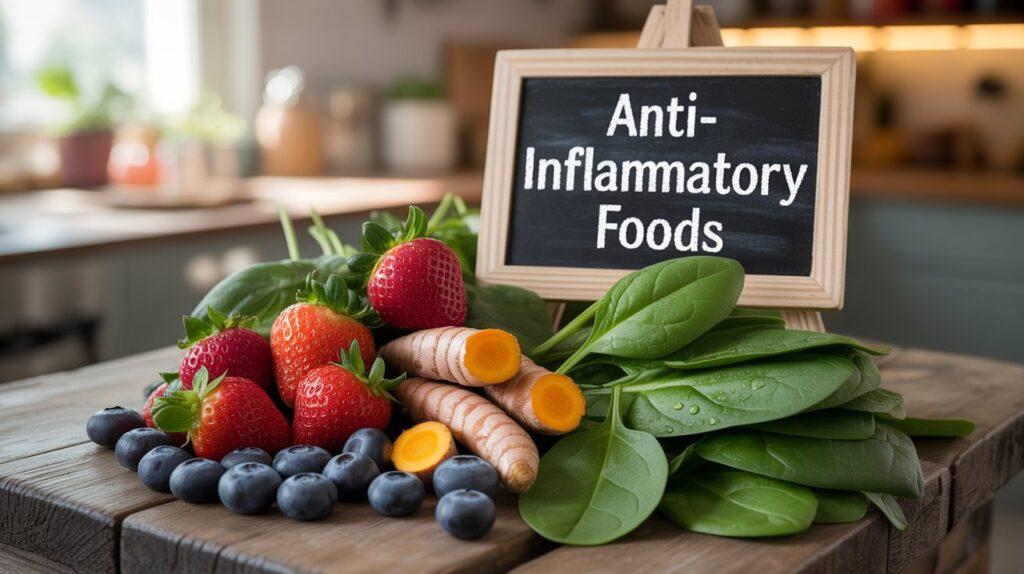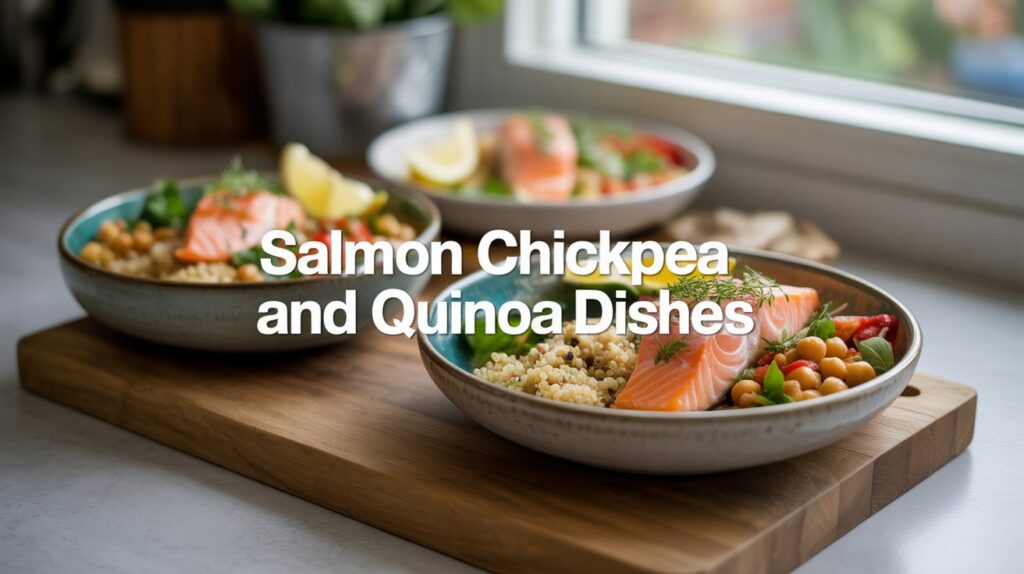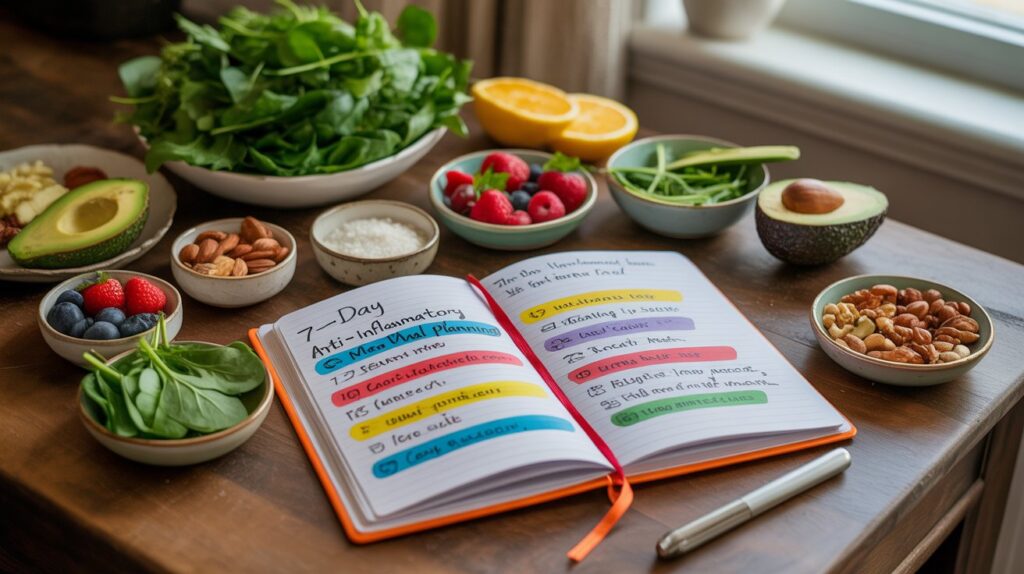If you’re looking to boost your health, manage chronic inflammation, and enjoy flavorful dishes every day, this guide is for you. A well-designed 7-day anti-inflammatory meal plan created with the help of a dietitian can transform the way you eat and feel. Whether you’re interested in a 7-day no-sugar meal plan or other options, it’s essential to focus on nutrition. Anti-inflammatory meals, curious about meal planning, or need an anti-inflammatory meal plan for beginners, you’ll find practical tips, easy recipes, and a clear diet plan you can follow without stress.
What Is an Anti-Inflammatory Diet and How Does It Work
An anti-inflammatory diet focuses on eating foods that help reduce inflammation in the body. Chronic inflammation is linked to a range of health conditions such as heart disease, arthritis, and type 2 diabetes. This eating style replaces highly processed foods and excess added sugar with nutrient-rich options like a 7-day no-sugar meal plan should include a variety of fruits and vegetables. Whole grain foods are important components of meal plans to be easy to follow. A 7-day no-sugar meal plan is meant to include healthy fats and lean proteins.
By following an anti-inflammatory meal plan, you not only enjoy delicious dishes but also improve gut health and support your immune system. The Mediterranean diet is a great example of an eating plan rich in anti-inflammatory properties, emphasizing omega-3 fats from fish such as salmon. Including salmon in your 7-day no-sugar meal plan provides healthy fats and protein. Plenty of dark leafy greens, and legumes such as chickpeas can be included in meal plans to be easy-to-follow and nutritious.
Why Meal Planning Is Key to a 7-Day Anti-Inflammatory Meal Plan
Meal planning helps you stay consistent, reduces the temptation to choose highly processed foods, and ensures your nutritional needs are met. When you plan your meals in advance, you can better control added sugar intake and avoid last-minute, unhealthy choices.
A 7-day anti-inflammatory meal plan gives structure and makes it easier to shop for. Incorporate anti-inflammatory foods into your 7-day no-sugar meal plan in bulk. It also simplifies meal prep, allowing you to roast vegetables. A 7-day no-sugar meal plan can include a delicious smoothie made with fruits and vegetables. Packs and stores cooked grains like quinoa for quick assembly during the week.
Anti-Inflammatory Foods That Reduce Inflammation

The foundation of any anti-inflammatory diet is nutrient-dense, rich in antioxidants. Incorporate foods that are naturally low in sugar into your meal plans to make them easy to follow. Top anti-inflammatory foods include avocado, salmon, berry varieties, and whole legume sources like chickpea. These foods offer anti-inflammatory benefits through omega-3 content and high fiber. Fiber is an essential nutrient that can be included in meal plans to be easy to follow, and it is abundant in phytonutrients.
Using a 7-day no-sugar meal plan is meant to include herbs and spices for flavor. Like turmeric, ginger, and garlic, they enhance the antioxidant and anti-inflammatory profile of meals. These ingredients not only boost flavor but also help lower inflammatory markers in the body.
How to Build Balanced Anti-Inflammatory Meals
A balanced 7-day no-sugar meal plan is essential for maintaining energy and health. An anti-inflammatory meal plan should include healthy fats like olive oil and avocado, lean protein such as salmon, chicken, or tofu, and whole grain carbohydrates like quinoa. A 7-day no-sugar meal plan is meant to be easy to follow, including brown rice and plenty of healthy fats and fruits and vegetables. This balance supports a 7-day no-sugar meal plan that promotes overall health. Blood sugar levels are reduced, inflammation in the body is reduced, and dietary guidelines are followed.
Following an anti-inflammatory diet plan, being mindful of portion sizes, and avoiding excessive sugar means creating meal plans that are easy to follow. Processed foods with excess sugar and trans fat. Instead, focus on simple recipes you can cook in batches, making it easier to stick to your plan.
Sample Menu for a 7-Day Anti-Inflammatory Diet
Here’s a sample menu to inspire your seven-day meal plan:
- Breakfast: Greek yogurt with berry compote and chia seeds
- Lunch: Salmon salad with dark leafy greens, avocado, and olive oil dressing
- Dinner: Roast vegetables with quinoa and grilled chicken
This seven-day anti-inflammatory plan is meant to serve as a diet guide that includes delicious anti-inflammatory recipes for meals and snacks. The plan is meant to serve as a template you can customize.
Breakfast Ideas From Smoothies to Yogurt Bowls
Mornings are perfect for smoothie blends made from berries, spinach, and almond milk, offering a quick dose of fiber, healthy fats, and omega-3 seeds like flax or chia. Smoothies are a great way to start your day. A 7-day no-sugar meal plan can help you prepare nutritious meals every day that align with anti-inflammatory recipes.
If you prefer something more filling, try a yogurt bowl topped with fruits and vegetables such as grated carrot or apple, whole grain granola, and avocado toast on the side. A registered dietitian can help you adapt these ideas to your dietary needs.
Lunch Inspiration Salmon Chickpea and Quinoa Dishes

Lunch is the perfect time to enjoy protein-rich anti-inflammatory meals like salmon and quinoa bowls. Both ingredients are foods rich in anti-inflammatory properties that can be incorporated into meal plans to be easy to follow. Compounds provide healthy fats and fiber for sustained energy.
For a plant-based option, toss roasted chickpeas with dark leafy greens, avocado, and tahini dressing. Legume-based lunches help meet nutritional needs and can support following an anti-inflammatory eating plan without sacrificing flavor.
Dinner Favorites Roast Vegetables and Healthy Fats
Dinner on an anti-inflammatory meal plan is a chance to enjoy hearty dishes like roast sweet potatoes, Brussels sprouts, and zucchini with grilled salmon or chicken. Pairing roast vegetables with healthy fats like olive oil not only tastes great but also improves nutrient absorption.
A warm whole-grain pilaf with quinoa, herbs, and avocado slices is another comforting choice. This combination helps maintain steady blood sugar levels and reduces the inflammatory response after meals.
Day 7 Special Meals to End the Week Strong

On day 7, treat yourself to something extra satisfying while sticking to your 7-day anti-inflammatory diet. Start the day with a smoothie bowl topped with fresh berries and nut butter. Lunch could be a roast vegetable wrap with hummus and avocado, while dinner might feature baked salmon with lemon and herbs.
This seven-day meal plan balances flavor, variety, and anti-inflammatory properties, ensuring every meal or snack supports your wellness goals.
Tips for Sticking to Your Anti-Inflammatory Diet Plan Long-Term
Sticking to a diet plan requires preparation, flexibility, and creativity. Keep a list of simple recipes handy, batch-cook quinoa and roast vegetables, and freeze portions of salmon for quick use.
The 2020-2025 dietary guidelines for Americans recommend an eating pattern rich in fruits and vegetables, whole grains, and lean protein, all of which can offer anti-inflammatory benefits. By planning ahead, you make it easier to avoid highly processed foods and stay consistent with your meal planning.
Key Takeaways
- Meal planning is essential for a sustainable anti-inflammatory diet
- Focus on anti-inflammatory foods like salmon, avocado, chickpea, quinoa, and dark leafy greens
- Limit added sugar and highly processed foods to reduce inflammation
- Include healthy fats, fiber, and whole-grain sources daily
- Use smoothie bowls, yogurt breakfasts, and roast vegetable dinners to keep meals exciting
- A 7-day anti-inflammatory meal plan can be adapted to meet your nutritional needs and taste preferences
- Following an anti-inflammatory approach supports gut health and may lower inflammatory markers
FAQ
Q1 What should a beginner eat for an anti-inflammatory diet
A1: A beginner should focus on fruits and vegetables, whole grain foods, healthy fats like olive oil and avocado, lean proteins such as salmon and chicken, and legumes like chickpeas. Avoid sugar and processed foods in your 7-day no-sugar meal plan. Highly processed foods and limit added sugar to help reduce inflammation.
Q2 How can I reduce inflammation in 7 days
A2: In 7 days, you can reduce inflammation by eating anti-inflammatory foods such as dark leafy greens, berries, salmon, and quinoa, while avoiding processed foods and excess sugar. Drink plenty of water, get enough sleep, and include healthy fats to balance inflammatory markers.
Q3 What is the number one food that kills inflammation
A3: Salmon is often considered the number one food for fighting inflammation because it’s rich in omega-3 fats, which help lower inflammatory response in the body.
Q4 7-day anti-inflammatory meal plan
A4: A 7-day anti-inflammatory meal plan includes breakfasts like smoothie bowls or yogurt with berries. A 7-day no-sugar meal plan is meant for lunches with healthy fats. Salmon or chickpea salads, and dinners with roast vegetables and quinoa. This diet plan is rich in anti-inflammatory nutrients and supports gut health.
Q5 5-day anti-inflammatory meal plan
A5: A 5-day anti-inflammatory meal plan can follow the same principles, with five days of nutritious meals like avocado toast, grilled salmon, quinoa bowls, and roast vegetable dishes, ensuring a balance of fiber, healthy fats, and lean proteins.





